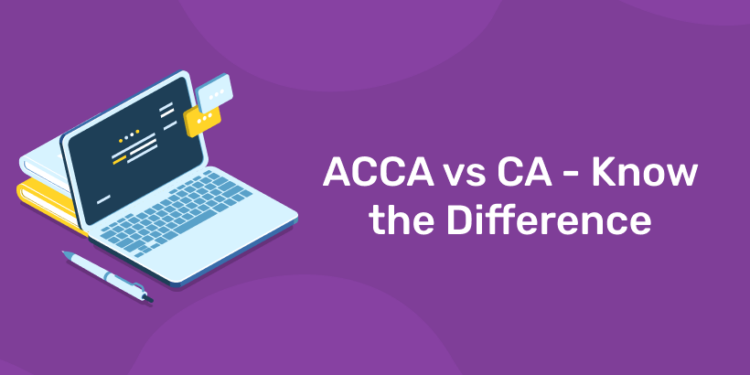Table of Contents
For a basic understanding, ACCA is equivalent to CA in the United Kingdom. ACCA has global recognition, not only in the United Kingdom but also in a number of other countries, whereas CA has limited recognition in comparison to ACCA. However, ACCA cannot practice in India, i.e., an ACCA cannot sign a balance sheet in India; that power is reserved for CAs only. If you want to start your practice in India, then CA is the way to go; but, if you want to work for a firm and settle outside of India, then ACCA is the way to go. That doesn’t mean that if you have a CA degree, you won’t receive international opportunities; you will. However, if you want to advance in your profession, you’ll need more than a CA degree. Lets know more about the course and the differences through the following points.
To know more about ACCA course, Click Here!
Knowing the courses
ACCA-Association of Certified Chartered Accountant.
- Full form of ACCA is Association of Certified Chartered Accountant which is certified by the Association of Chartered Accountant. Candidates successfully passing the course are eligible for Auditing, taxation, Management Accounting, Handling accounts etc for public firms as well as private Organizations.
- The primary Work is related to inspection across Taxation & accounting to the public, private entities etc. The candidates required passing the Exam and acquire the certificates before the inspection of Public and Private entities. Other than Auditing; taxation etc ACCA can work globally across any Field of finance like Finance Controlling, Accounting, and Financial Analysis etc. A certified ACCA deals with International Accounting Standards.
- ACCA is an international degree and accepted across the globe; more than 180 countries.
- ACCA is more than 100 years old course and is accepted in more or less every country.
- The Candidates primarily deals with the rules and regulations and implementations of policies within a company and compile with the Auditing and Taxation part.
- The Minimum requirement of enrolling the course is three years of work experience with graduation or equivalent degree and complete three stages.
CA-Chartered Accountant.
- CA stands for Chartered Accountant which specializes in Financial Accounting and Finance and caters to all the fields of Finance. The degree is given by ‘The Institute of Chartered Accountants of India’. After passing the exam, the candidates are entrusted with several fields within finance and Accounts.
- Chartered Accountants work across various Finance positions primarily in Government Concerns and Private entity. They can work under their own firm with the help of their own registration number. The certificates are primarily valid across India as the degree is given by Indian Institute of Chartered Accountants. The Degree is not valid outside India. The Accounting Standard which they deal with is primarily GAAP and IAS.
- The tenure of the three to five years depending upon the capability of the candidate and with additional experience of one year.
- CA is only valid in India as the course is designed for India only. The Institute of Chartered Accountants is the authorized entity for the course.
- CA is applicable only in India and was commenced in the year 1944.
- CA works with the Government and as well as a private organization at the level of Gazette Officer. The power of attorney is given by the ICAI.
- Minimum criteria required are Passing of Matriculation.
CA vs ACCA Comparison Table
1: Accounting provides information on
| BASE | CA | ACCA |
| Professional Body | Institute of Chartered Accountants of India (ICAI) | Association of Chartered Certified Accountants (ACCA) |
| Recognition | India | Global |
| Exam | Three Levels | Two Levels |
| Structure | CA Foundation (4 Papers)
CA Intermediate (8 Papers)
CA Final ( 3 years of articleship training) (8 Papers)
|
Fundamentals (9 Papers)
Professionals (5 Papers) |
| Total fee | Below 1 Lakh | Between 2-3 lakhs |
| Focus | CA courses focus on accounting , auditing, taxation ,Finance ,company law etc results in expertise in multiple domains | An ACCA course mainly focuses on accounting and finance. |
| Toughness | CA is considered the toughest course in India. | ACCA is not easy but not as hard as CA. |
| Practical Training | 3 Years articleship Training has been a mandatory part of the CA curriculum. | Similarly, ACCA has also made compulsory 3 years of practical training. |
| Signing Authority | Only Practicing Chartered Accountant is qualified to sign the audit report in India. | ACCA is not qualified to sign the audit report in India. |
| Course | CA is mainly India based course hence here students get a study base of Indian laws and standards. | ACCA has global coverage and therefore it is based on UK laws and standards. |
| Flexibility | CA is not Flexible. Here a student has to attempt at least a group of time. | ACCA is considered Flexible as here students can attempt a single paper in each attempt. |
| Earnings | The Average salary of a CA lies between 6-7 lakhs. | The Average earnings of ACCA lies between 5-6 lakhs. |
| Prefer | Indian companies prefer CA s as they are aware of the Indian laws and standards. | Multinational Companies who are handling the work of overseas clients or companies outside India prefer ACCA. |
| Demand | Rapidly increasing with the implementation of new laws in the country. | The scope is limited but expected to grow in the future. |
Placement Oriented PWC Business Accounting Course
PWC Certified Business Accounting Course by Entri App: Master in-demand skills, ace interviews, and secure top-tier jobs.
Join Now!Conclusion
The legal component, as well as the application of many rules within the organisation, has been highlighted in this CA versus ACCA article. As a result, a team of finance professionals is critical in today’s organisation. Both the CA and the ACCA are fairly comprehensive courses that cover practically everything that finance professionals need to know. Individuals, government bodies, non-profit organisations, and businesses can all benefit from the services provided by the professionals. Taxation, accounting, auditing, finance, financial analysis, and other sectors are among the services they provide. As a result, CA vs ACCA courses come into play to ensure that the business runs efficiently.













